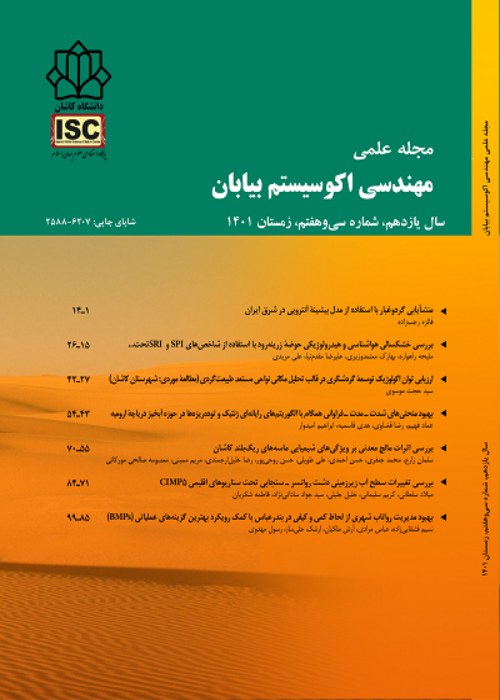Evaluating the Effects of Desertification Combating Projects on the Socio-Economic Conditions of Local Communities in Ahvaz
Desertification combating projects are usually developed and implemented to protect water and soil and keep sustainable development of local communities. Therefore, evaluating the socio-economic effects of such projects is highly important for identifying and addressing the challenges involved in this regard and perpetuating their positive effects. Thus, this study sought to evaluate the socio-economic effects of the desertification projects and plans implemented in the southeastern region of Ahvaz in 2021.
this study used the documentary method to investigate the theoretical dimensions of the subject and a survey method to collect the required quantitative data. The study's statistical population consisted of two groups of rural residents and experts familiar with the study area. Based on Cochran's formula and matching with Krejcie and Morgan's table, 335 rural residents were selected to participate in the study, using random sampling. Moreover, 26 experts participated in completing the questionnaires and conducting the research. After confirming the questionnaire's validity, Cronbach's alpha coefficient was obtained as 0.86 and 0.83 for rural residents and experts, respectively. On the other hand, the prioritization of the economic and social effects of the projects was performed through the average rankings. Finally, the mean comparison of the viewpoints of rural residents and experts was assessed through a Mann-Whitney test.
According to the study's results, improving the employment opportunities and job creation, increasing the price of land in the region, and reducing the migration incentives are ranked first to third in terms of priority from the rural residents' viewpoints with the average values of 4.20, 4.15, and 4.12, respectively, followed by the influence of water and soil protection, dust reduction, and the participation of the local community in the implementation of desertification combating plans and operations, respectively. Moreover, the analysis of the experts' opinions showed that water and soil protection, dust reduction, increases in land prices, improvement of employment opportunities, reduction in migration incentives, and increases in the level of the local and rural communities' trust in goals and programs of executive departments were the most important effects of project implementation in the region with the average values of 4.46, 4.31, 4.19, 4.15 and 4.11, respectively.The mean values of the desertification combating projects were compared between the rural residents' viewpoints and experts' opinions using the Mann-Whitney test, revealing a statistically significant difference between the opinions of rural residents and experts in terms of the effects of water and soil protection and dust reduction, increases in the villagers' revenues, diversification of the villagers' income sources, and strengthening the cooperation and social cohesion among local communities. All of these items had a higher average rank in the experts' viewpoint except for "strengthening the cooperation and social cohesion among local communities. Experts significantly out-evaluated the consequences of the implemented combating desertification projects concerning the water and soil protection, dust reduction, increases in the villagers' revenues, and creation of a variety of new income resources compared to the rural residents. In other items regarding the effects of the projects, no statistically significant difference was found between the viewpoints expressed by residents and experts. As for the economic effects, there was a statistically significant difference between the experts' and rural residents' viewpoints (P<0.05), with the implementation of projects having more significant prominent effects in the experts' view. However, there was no statistically significant difference between the viewpoints offered by experts and residents in terms of the social effects of combating desertification projects (P>0.05).
According to the viewpoints expressed by both experts and rural residents, water and soil protection, dust reduction, improvement of job opportunities, increases in the price of land in the studied region, and reduction in migration incentives are the most important economic and social consequences of desertification combating projects. Moreover, the viewpoints of experts and rural residents of the region concerning the economic and social consequences of the projects were close to each other and did not differ significantly, indicating their mutual understanding and intellectual proximity of the issue. Therefore, it appears that strengthening such a relationship helps desertification combating projects to be more successful. The results of this study also showed positive and acceptable effects of the projects in the study area. In fact, the implementation of such projects has improved the conditions for the sustainability and activity of rural communities. However, new plans should be developed for improving the welfare status, increasing the revenues, improving the water quality, increasing the production of crops, and increasing horticulture products. On the other hand, attracting the stakeholders' participation by promoting conservation knowledge and culture, using the potentials and capacities of the region, and providing the necessary facilities and financial support in terms of combating desertification goals and measures can help increase the chances for the success of desertification combating projects.
- حق عضویت دریافتی صرف حمایت از نشریات عضو و نگهداری، تکمیل و توسعه مگیران میشود.
- پرداخت حق اشتراک و دانلود مقالات اجازه بازنشر آن در سایر رسانههای چاپی و دیجیتال را به کاربر نمیدهد.


